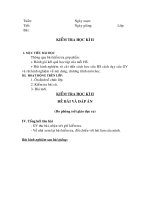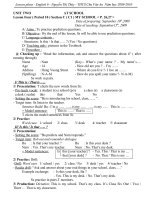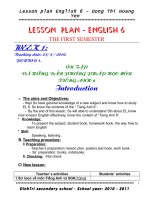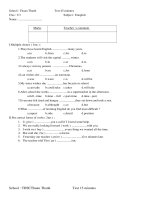anh 6 tuan 36
Bạn đang xem bản rút gọn của tài liệu. Xem và tải ngay bản đầy đủ của tài liệu tại đây (217.56 KB, 10 trang )
Week: 37
Period: 102
Date of preparation: 10/05/2019
Date of teaching:
14/05/2019
UNIT 16: MAN AND THE ENVIRONMENT
SECTION A: ANIMALS AND PLANTS
LESSON 2: A2
I. OBJECTIVES: By the end of the lesson, Ss will be able to read the text about the
famer’s routine.
II. PREPARATIONS: Textbook, pictures, cassetle
III. PROCEDURES:
TEACHER’S ACTIVITIES
1/ Warm-up: (8’)
- Ask Ss to make sentences with the given words.
1. there/ a lot / flowers.
2. there / little / water.
- Lead to the lesson
2/ Presentation: (12’)
- Teach new words.
I. Vocabulary:
1. animals (n)
STUDENTS’ ACTIVITIES
- Make sentences.
1. There are a lot of flowers.
2. There is a little water.
- Listen to the teacher.
- Read, then copy down.
2. a cow (n)
3. (to) plow (v)
4. (to) pull a cart (v)
5. (to) grow (v)
6. (to) produce (v)
7. buffalo (n)
*Check: Net work
- Have the class predict 6 things Mr. Hai has on
- Guess.
his farm and 5 things he produces.
3/ Practice: (15’)
Activity 1:
- Have Ss read the text and check their
- Read and check.
prediction.
Mr. Hai has
Mr. Hai produces
1. paddy fields
1. rice
2. a small
2. vegetables
vegetable field
3. fruit
3. fruit trees
4. milk
4. buffalo
5. eggs
5. cows
6. chickens
Activity 2:
- Have Ss do pair work to ask and answer the
questions on page 167.
- Get feedback.
- Work in pair and answer the
questions
a. He produces a lot of rice.
b. Yes, he does.
c. He produces a little fruit.
d. His cows produce a little milk.
e. His chickens produce a lot of
eggs.
- Give feedback.
4/ Production: (8’)
- Have Ss ask and answer about Mr. Hai
- Work in pair.
S1:How many paddy fields does Mr.
Hai have?
S2: He has some……
5/ Homework: (2’)
- Ask Ss to:
+ Learn vocabulary by heart,
+ Prepare Unit 16: B1, 2.
- Write assignment.
IV. COMMENT:
...............................................................................................................................................
...............................................................................................................................................
...............................................................................................................................................
Week: 37
Period: 103
Date of preparation: 12/05/2019
Date of teaching:
15/05/2019
UNIT 16: MAN AND THE ENVIRONMENT
SECTION B: POLLUTION
LESSON 3: B1, 2
I. OBJECTIVES: By the end of the lesson, Ss will be able to:
+ Read the text about the environmental issues.
+ Talk about the things they should or shouldn’t do to our environment.
II. PREPARATIONS: Textbook, pictures, cassetle
III. PROCEDURES:
TEACHER’S ACTIVITIES
1/ Warm-up: (8’)
- Have Ss revise the words by playing the game:
Slap the board.
bottles
grass
STUDENTS’ ACTIVITIES
- Play “slap the board”.
cans
Wild
- Lead to the lesson
2/ Pre-reading: (12’)
- Teach new words.
I. Vocabulary:
1. the environment: explanation
2. the ocean: synonym = the sea
3. trash: explanation
4. power: example
5. gas: explanation
6. coal: explanation
7. to destroy: explanation
8. to waste: explanation
9. to pollute: explanation
* Check: Rub out and remember.
- Have Ss observe the picture, and predict the
topic.
- Listen to the teacher
- Listen and take note.
- Do as directed
- Predict.
3/ While-reading: (13’)
- Have the class read the text and check their
prediction.
- Have the class ask and answer the questions in
groups.
- Check their answer.
- Check their prediction.
- Ask and answer in groups.
- Present.
a) Because we are destroying the
forests.
b) Gases are polluting the air.
c) The pollution comes from gases and
trash.
d) Trash is polluting the land, the rivers
and the oceans.
4/ Post-reading: (10’)
- Ask Ss:
How can we help our environment?
- Divide class into 2 groups DON’T and DO,
ask them to make sentences using “We
shouldn’t” & “We should”
5/ Homework: (2’)
- Learn vocabulary by heart.
- Rewrite the sentences.
- Prepare Unit 16: B4,5
- Make sentences.
+ Don’t throw trash on the street.
+ Don’t pick flowers.
+ Don’t damage trees.
+ Don’t throw trash in the country.
+ Keep off the grass.
+ Save water.
+ Collect paper.
+ Collect bottles and cans.
- Play game.
- Write assignments.
IV. COMMENTS:
...................................................................................................................................................
...................................................................................................................................................
...................................................................................................................................................
Week : 35
Period: 104
Date of preparation: /05/2016
Date of teaching:
/05/2016
UNIT 16: MAN AND THE ENVIRONMENT
SECTION B: POLLUTION
LESSON 4: B4, 5
I. OBJECTIVES: By the end of the lesson, Ss will be able to talk about the things they
should or shouldn’t do to our environment.
II. PREPARATIONS: Textbook, pictures, cassetle
III. PROCEDURES:
TEACHER’S ACTIVITIES
1/ Warm-up: (10’)
Matching
- Hang on the pictures.
- Lead to the lesson
2/ Presentation: (10’)
- Introduce some new words:
I. Vocabulary:
1. should: nên
2. shouldn’t: không nên
3. to recycle (v): tái chế
4. to leave = to throw (v)
- Have Ss listen and repeat B4/p.171.
- Ask Ss to practice in pairs.
STUDENTS’ ACTIVITIES
- Observe and match.
+ Don’t throw trash on the street.
+ Save water.
+ Don’t damage trees.
+ Collect bottles and cans.
+ Don’t pick flowers.
- Listen to the teacher.
- Read aloud and take note.
- Listen and repeat.
- Practice in pairs.
3/ Practice: (15’)
- Ask Ss to make the similar sentences using
pictures in B5/p.172.
* Example:
a) We should not leave trash.
- Ask Ss to give feedback.
4/ Production: (8’)
- Asks Ss to write the rule for the pictures.
* Notes:
Lời khuyên:
We should
+ V (bare-inf)
We should not
5/ Homework: (2’)
- Have Ss learn by heart vocabulary and the
rule.
- Prepare Grammar Practice
- Make the sentences in pairs.
- Give feedback.
b) We should save water.
c) We should not damage trees.
d) We should collect bottles and cans.
e) We should not pick flowers.
- Write the rule.
- Write assignments.
IV. COMMENTS:
...............................................................................................................................................
...............................................................................................................................................
...............................................................................................................................................
Week: 35
Period: 105
Date of preparation: 22/04/2019
Date of teaching: 25/04/2019
GRAMMAR PRACTICE
I. OBJECTIVES: By the end of the lesson, Ss will be able to revise the main knowledge
from unit 15 to unit 16.
II. PREPARATIONS: Textbook
III. PROCEDURES:
TEACHER'S ACTIVITIES
1/ Warm-up:
- Ask ss to talk about some countries, nationalities and
languages that they have known.
Country
Nationality
Viet Nam
Vietnamese
Japan
Japanese
China
Chinese
Australia
Australian
Great Britain
British
Canada
Canadian
- Lead to the lesson
Language
Vietnamese
Japanese
Chinese
English
English
English&French
2/ Exercises:
Practice 1:
- Ask Ss to do the exercise 1 on page 174.
E.g: a. Nam: Where are you from?
Tom: I am from Canada
Nam: Do you speak Vietnamese?
Tom: No,I don't. I speak English and French
- Call on some pairs to practice to class.
- Correct mistakes.
Practice 2:
- Ask them to do exercise 2 with a friend.
E.g: a. What is her name?
Her name is Susan
- Call on some pairs to practice to the class.
- Correct if necessary.
3/ Production:
- Ask Ss to write a short paragraph in order to
introduce themselves.
Where are you from?
STUDENTS' ACTIVITIES
- Remind.
- Listen to the teacher
- Do the exercise.
b.speaks
c.speaks Chinese
d.speaks Japenese
e.speaks Vietnamese
f.speaks English
- Practice in front of the class.
-Do the exercise.
b.lives
c.is-is staying
d.is
e.does-teaches
f.does-teach-doesn't-teaches
- Practice in front of the class.
- Write a short paragraph.
Which language do you speak?
What do you do?
How do you go to school?
- Get feedback.
4/ Homework:
- Request Ss to study the grammar again.
- Hand in.
- Write assignment.
IV. COMMENT:
...............................................................................................................................................
...............................................................................................................................................
...............................................................................................................................................
Week: 35
Period: 106
Date of preparation: 22/04/2019
Date of teaching: 02/05/2019
GRAMMAR PRACTICE
I. OBJECTIVES: By the end of the lesson, Ss will be able to revise the main knowledge
from unit 15 to unit 16.
II. PREPARATIONS: Textbook
III. PROCEDURES:
TEACHER'S ACTIVITIES
1/ Warm-up:
- Ask Ss to complete the table.
Adj
comparative
superlative
Long
Longer
The longest
Short
Shorter
The shortest
Tall
Taller
The tallest
Small
Smaller
The smallest
Big
Bigger
The biggest
High
Higher
The highest
thick
thicker
The thickest
- Lead to the lesson.
2/ Exercises:
Practice 1:
- Ask Ss to revise the comparatives and superlative
forms of short adjs.
*Comparative: S1+ be + adj-er + than + S2
*Superlative: S + be + the + adj-est
- Ask Ss to complete the table then complete the
passages (Exercise 3).
adj
comparative
superlative
Long
Longer
The longest
Short
Shorter
The shortest
Tall
Taller
The tallest
Small
Smaller
The smallest
Big
Bigger
The biggest
High
Higher
The highest
thick
thicker
The thickest
STUDENTS' ACTIVITIES
- Remind.
- Listen to the teacher.
-Do the exercise.
a.longer-the longest
b.the longest
c.the tallest-taller-the tallest
d.the biggest-bigger-the biggestthe biggest
Practice 2:
- Ask Ss to revise some indefinite quantifiers: a few/ - Revise.
a little/ a lot/ lots.
* a few + countable nouns
* a little + uncountable nouns
- Ask Ss to complete the passage in exercise 4 with a - Do the exercise with a friend.
partner.
*The street of HN are very busy. There is a lots of
traffic. Most people only have a little money to
spend on transportation. As a result, there are only a
few private cars on the roads. The bike is the
cheapest form of transportation, so there are a lots of
bikes. There are a lots of taxis, but they are
expensive.
3/ Production:
- Ask Ss to write a short paragraph in order to
introduce themselves.
* E.g: My name is Lan. I come from Viet Nam. I'm
Vietnamese. I speak Vietnamese.
4/ Homework:
- Request Ss to study the grammar again.
- Write a short paragraph.
- Write assignment.
IV. COMMENTS:
...............................................................................................................................................
...............................................................................................................................................
...............................................................................................................................................









